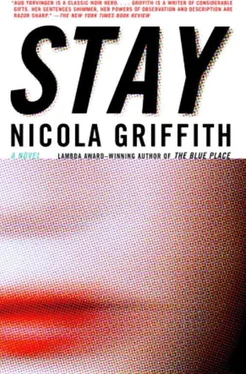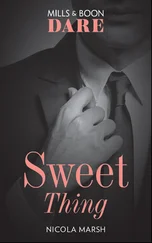“You know better than that.”
“I don’t know what I know anymore. I’m so… Everything’s changed.”
“You’ve changed. That’s what I wanted you to realize the other night.”
“What if I want to change back?”
Her smile was sad. “Doesn’t work that way.”
She reached out as if to touch me, and for a second I thought I felt her fingers on my cheek, then realized I was crying. “It’s so hard, without you.” Help me, I wanted to say, stop this terrible ache.
“Road,” she said, and nodded at the CAUTION signs and the grooved road where the surface had been ripped off to prepare for a new layer of asphalt. Tires roared over the striations. I had to concentrate to keep the trailer in its lane.
“Why did you bring that thing, anyway?” she said.
“Cheaper than motels.”
“Since when have you worried about money?”
I just shook my head. The roadworks ended and we were now on velvety new blacktop. The wheel noise faded to a smooth hum.
“So,” she said. “Tell me what the plan is when you get to Arkansas.”
“I won’t know. Not until I see how they—the Carpenters—are treating her.” I made an effort. “As far as I know, she’s not on anyone’s radar. No one is looking for her, no one even knows she exists, except the Carpenters and whoever placed her with them. If I decide to take her out of there, no one will complain.”
“So what will you do with her, if you take her?”
I hadn’t the faintest idea.
“Would you keep her?”
“What for, target practice?” Silence. “No, I wouldn’t keep her. Not even if she was a normal, well-adjusted child—and what she’s been through has probably left her essentially broken. Broken people, as we both know, don’t mend.”
She studied me for a moment. “Pull over. There’s a rest stop ahead.”
When the engine was quiet I rolled down the window; it was cold. A hardy chickadee sang from the pines alongside the rest stop. The place smelled of freshly sawn wood. She swiveled to face me.
“Self-pity doesn’t suit you.”
“No?”
“You are not broken.”
“Normal people don’t hurt others in elevat—”
“Let me finish. You’re not broken, you’re grieving. You’re grieving because you can feel. No, your mother didn’t love you, and yes, you pretended you didn’t care, but pretending doesn’t make it true.”
“Then—”
“Don’t be dense. You were protecting yourself. You wrapped yourself in armor and pretended to be invulnerable. Growing up inside that armor twisted you a bit out of true, but it doesn’t matter. The essentials are all there.”
She searched my face.
“The armor’s getting too small, Aud. You have to choose.”
Tennessee had not exactly oozed wealth, but when I pulled off the interstate west of the river for something to eat, eastern Arkansas under the winter-pale late afternoon sun—the gas stations, the shacks with TV antennae, other vehicles on the road, even the dirt—sighed tiredly with poverty, worn and faded as though it had been through too many summers without shade, too many growing seasons without replenishment, too great a workload with no relief. Perhaps it was my mood, but I felt heavier just driving through it.
Once I was back on the interstate, the road became bland and boring. Towns like truckstops punctuated some fallow farmland and a few plowed fields. A hundred miles west of Memphis, the towns gave way to the river valley. I left I-40 twenty-five miles past Little Rock and wound west through backcountry roads, where settlement grew a little less dense and the countryside hillier, shrouded here and there with clumps of pine. For a seven-year-old fresh from the color and noise of Mexico City, it must have looked bleak.
But seven-year-olds are plastic, almost endlessly adaptable. Perhaps Luz no longer remembered much about Mexico; perhaps she no longer spoke Spanish; perhaps she was dull and content to follow her fate. Perhaps I should have stayed in North Carolina instead of driving out here in what was probably a hopeless cause.
The yellow lines slipping beneath my wheels dimmed to lemon, then dust, then disappeared altogether. The wheels hissed on loose gravel, and something in the trailer began to rattle rhythmically. Should have run, should have run, should have run. After an hour the pine and white oak grew thick and I was in the corner of a state park. I turned onto the first track I saw, and bumped along at twenty miles an hour until it grew dark enough to need headlights. Then I pulled over and turned the engine off.
The forest was still and quiet and smelled of pine needles. My breath sounded soft and even. I had the overwhelming urge to put my head on my arms and sleep. It wouldn’t solve anything but it would make the questions go away for a while.
Who had the right to choose for a nine-year-old girl? Her parents? There had been no mention of a father, and her mother had already lost her, in all probability had given her away, exchanged her for money—even assuming she was still alive. Her adoptive father? He had forfeited any rights he might have had. Her foster parents? They were doing it for money. The state? They could offer nothing but deportation or a children’s home, and I had seen jails and psychiatric units and emergency rooms full of the product of the latter. And the girl herself? I had no idea.
I had to go see for myself. And if I saw she was being mistreated, I would not be able to simply turn around and leave and pretend none of this had ever happened. I would always wonder what I could have done, and inevitably I’d imagine Karp on his hospital bed and remember all those things I didn’t want to ever have to think about again.
Luz existed, a responsibility I didn’t want, resulting directly from my own actions. Perhaps my mother had felt the same way. I imagined a little brown-haired girl skipping along the pavement, holding the hands of her parents: me on one side, Geordie Karp on the other.
On the way to the Carpenters’ address, I passed two other vehicles, both full-size pickups. Both drivers stared for a moment, then raised an index finger from the steering wheel in acknowledgment. Big rigs were probably common in this part of the world. I could have been coming from anywhere, heading for anywhere else; I wasn’t worried. The road, graded and graveled by the county, wound through low hills. I saw no more vehicles. The turnoff to the Carpenter place was nothing but a dirt road, marked by a wooden board—their name and an arrow—that looked freshly repainted. I drove past and up a rise, and pulled into a stand of trees.
Some of the Carpenters’ fields lay bare, but judging from the neat rows of stubble, they were hayfields, bales long since sold. Clover and redtop stippled the field nearest the house, which looked tidy and cared for. It was painted light tan, probably three or four bedrooms, the kind of thing families had begun in the twenties and added to when time and money allowed.
From around the side three people—one large and two small, carrying bundles—came into view and climbed into the cab of a pale blue pickup. A Ford. I lifted a pair of field glasses and watched them jounce down the dirt track towards the county road. One adult and two children, all on the bench seat in the front. The early morning sun slanting in from the east and south turned their windscreen to fire, making it hard to be sure, but as they came over the slight rise I thought the one in the middle might be Luz. Yes. She was smiling while the boy on her right, whose face was lower down than hers, talked a mile a minute. It was a good smile.
I couldn’t get in the house because Adeline Carpenter was still there, and you can’t tail a vehicle when you’re towing several tons of fifth-wheel, but tomorrow was Sunday.
Читать дальше












